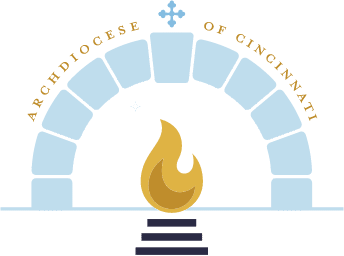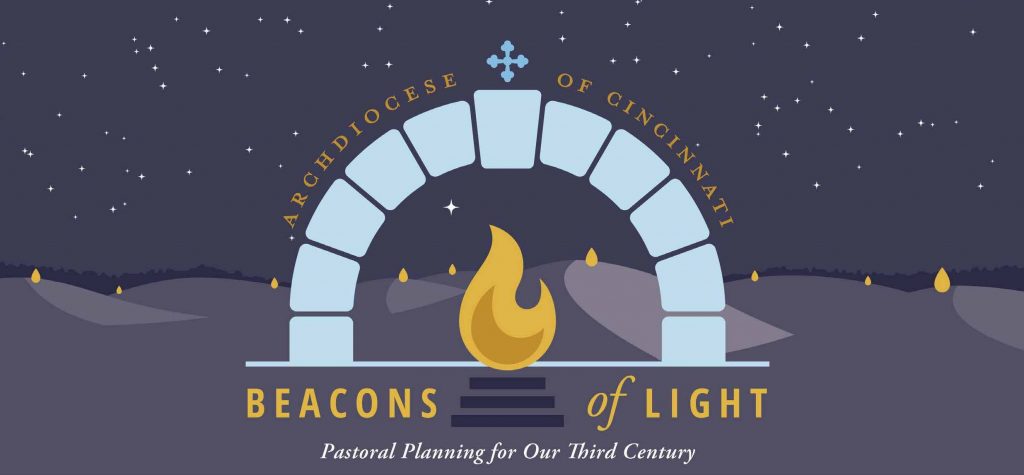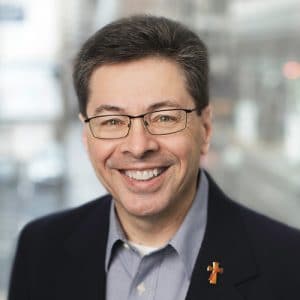This article is the third in a series covering each of the six foundational principles of Beacons of Light, the pastoral planning process of the Archdiocese of Cincinnati.
What does it mean to be a member of a church? The answer lies in how we define the word “church.”
In its most basic sense, “church” can simply refer to the building in which we celebrate the Mass and other sacraments. At a slightly higher level, it can be another form of the word “parish.” For example, “What church do you go to?” “I’m a member of Our Lady of Victory.”
We must remember, however, that our baptism makes us members of a very special “Church”—the Catholic Church. This is the Church founded by Jesus Christ, formed by the Apostles and handed on to every successive generation for 2,000 years. Our local church does not exist independently, but is in union with the Universal Church under the authority of our archbishop and the leadership of the holy father.
In the context of Beacons of Light, each of these aspects of “church” has a special role: Church as a sacred space, Church as a local parish, Church as Christ’s universal body. The core principle for Church, as set forth by the Beacons of Light, incorporates all these elements:
“Each of us is called to actively participate as a member of a parish, the Universal Church and our local Church, led by our archbishop. Parishes continually deepen the bonds of communion with other parishes.”
Our Families of Parishes will rely upon each other for success, recognizing the heritage of our past and embracing a common future. Several goals will make this possible.
- The Local Church is Organized into Deaneries: Our archdiocesan church operates effectively by dividing into regional deaneries. Our new canonical parishes (i.e., “Families of Parishes”) will continue to follow that organizational model and benefit through the interdependency of each parish with the other.
- Archdiocesan Communion with the Universal Church: In communion with the holy father, the archbishop exercises leadership in the local Church.
- Embracing Subsidiarity: One of the Church’s foundational social teachings is subsidiarity, which states that matters ought to be handled by the smallest, lowest or least centralized competent authority, and higher authorities should provide assistance to the lower authorities when appropriate. This enables decisions to be made at the local level wherever possible. Deaneries enhance regional subsidiarity, operating on a local level, which empowers Families of Parishes to cooperate with each other in all forms of ministry.
- Respecting Culture and History: In one Family of Parishes, the culture and history of our individual parishes are acknowledged, honored and, where possible, preserved. Efforts seek to blend cultural and historical differences with compassion and compromise.
- Recognizing Local and Universal Membership: The People of God understand that the parish comprises the people within a given territory, and therefore, they grow in understanding themselves as members of Christ’s Body, the Church.
We should not lose sight of the fact that our churches were brought together into Families of Parishes. This is an intentional designation. Families pray together, share their lives with each other, encourage each other and celebrate together. Just as we nourish and sustain our own families, we should strive to do likewise for our new parish family. Pray for the success of our priests, our parishes’ staffs and our brother and sister parishioners. Share in each other’s joys, sorrows, struggles and dreams. Encourage one another in our personal and spiritual growth. Celebrate our parishes’ similarities and differences, brought together in our common Catholic faith.
Lumen Gentium, Vatican II’s Dogmatic Constitution on the Church, tells us “The universal Church is seen to be ‘a people brought into unity from the unity of the Father, the Son and the Holy Spirit.’” As Church, we are the Body of Christ. As members of that Body we are on the journey of faith together – as one body, united in the Holy Trinity, for the good of our local church and the Universal Church. Our confidence rests in God that our parishes will truly come together as one family, one Church.


